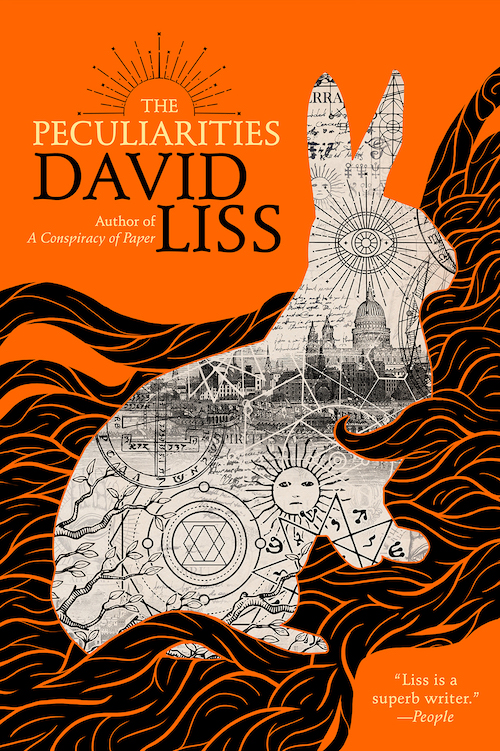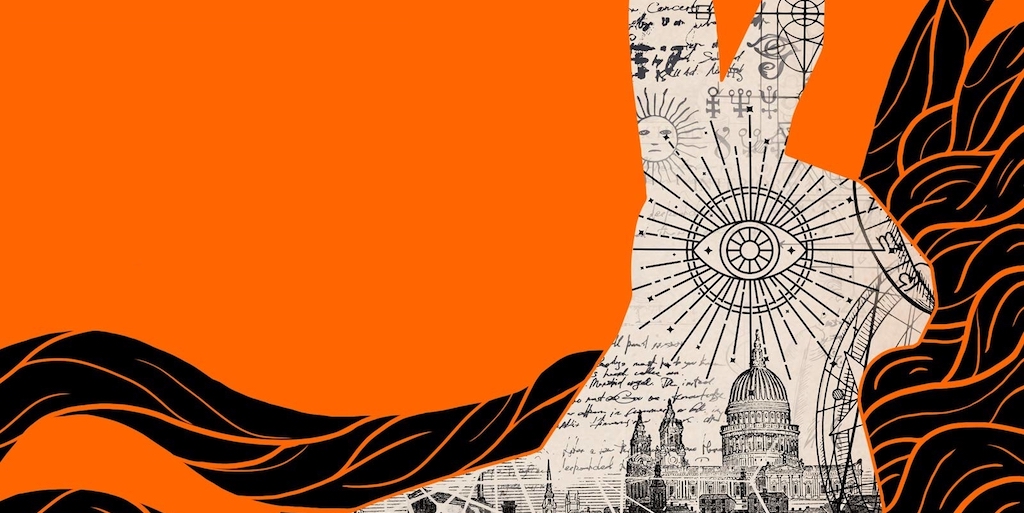David Liss is the award-winning author of several historical thrillers, a variety of anthologized short fiction, and Marvel universe comic books. I sat down with David to talk about his upcoming novel from Tachyon Publication, The Peculiarities.
Sadie Hartmann: David, thank you so much for talking with me today. What does a typical day usually look like for you?
David Liss: I’m a morning person, so I usually get up between 4-5am and start working right away. I’ll work on my current novel project until about 11 and then exercise, eat lunch, etc. In the afternoons I’ll usually work on some secondary project, anything from a short story to comics to gaming projects or just research, all depending on what’s going on. Throw in a little child transportation here and there just to keep things exciting. Then, as the household cook, I transition into making dinner. It’s all very exciting.
Sadie: I am a firm believer in mornings! It sounds like you’re a disciplined “every day writer.” Do you take long breaks in between WIPs or do you always have something going?
David: I hate not having something to write. When I feel like a project is wrapping up, I usually start researching the next book so I can hit the ground running. It doesn’t always work out perfectly, and so there are times when I’m researching instead of writing, but I’m always eager to get to the writing phase.
I definitely believe in keeping regular hours, though unless I have a deadline or I’m eager to finish something, I usually don’t work on weekends.
Sadie: And when you say research, I imagine that’s pretty intensive given the historical nature of your novels. How deep do you go? Do you find yourself ever having to pull back from a historical wormhole?
David: The math on how much to research is fuzzy. I basically do enough research so that what I don’t know is no longer getting in the way of the story I want to tell. The trick is to be comfortable and fluent in the material, but you can’t know everything, so there’s no point in trying. Once I start a book, I usually continue to research at least some aspects, since I’m constantly bumping up against my own ignorance. I’ve heard about people getting lost in research, but that doesn’t usually happen to me. In part because I prefer to be writing and in part, because I have an academic background, so the thrill of research was already old news when I wrote my first book.
Sadie: Did you always want to write fiction, or did your studies ultimately inspire you in that direction?
David: I’ve always loved stories in just about any form–prose fiction, television, film, comics, whatever–and I always wanted to create my own stories. When I was in my 20s, I didn’t think I knew how to write, so I ended up going to graduate school get a doctorate in English literature, but I ended up turning my dissertation research into my first novel.

Sadie: And you were immediately picked up by an agent and then straight to a publishing house, do I have that correct?
David: Looking back it seems like things happened very quickly, though it didn’t feel that way at the time. But I was very lucky, and things moved quickly, certainly by today’s standards.
This was a little over 20 years ago, and publishing had a more ebullient vibe than it has now. Editors were more willing to take risks on books.
Sadie: I have heard from various publishing veterans that the game is much different today than 10 or 20 years ago. And you’ve certainly written in a lot of genres and styles: adult novels, middle grade books, comics… of all of these, which do you find brings you the most joy? Or creative fulfillment, maybe? I know it’s a hard question…
David: I can’t say there’s one medium or genre I love more than the others. There are things I’ve written that I’m really proud of and things I’ve written that were just plain fun to work on, but I don’t think that’s a function of anything other than how much that particular story was clicking. So, that’s a very wordy non-answer.
Sadie: It works for me! It sounds like you have a lot of fun wearing all the writing hats. Let’s talk about your new novel, The Peculiarities. What are your favorite words to describe this novel to readers?
David: As I spend more time talking about the book in advance of its publication, I realize the novel began from contradictory impulses. On the one hand, I wanted to write about magic as it was actually practiced, but I also wanted to write about people undergoing bizarre physical transformations. I think fundamentally the book is about how people are affected by change and how they try to effect change themselves. It deals with serious topics, but it’s also slightly absurdist. Mostly I want people to have fun with it.
Sadie: I love that you said “absurdist,” because the word “whimsical” popped into my head as well. Do you think that readers might miss that this story is not to be taken too seriously?
David: I wouldn’t say that the story isn’t to be taken too seriously, but life is full of fantastically absurd moments. The novel is set at a time when the world is changing for its characters, becoming a significantly weirder place, and I wanted the characters to feel that strangeness, not just accept everything as ordinary.
Sadie: It’s true, life is full of absurdities even during very sobering times. How much do you try to incorporate modern attitudes and behaviors into historical times? And how much do antiquated belief systems or flawed attitudes from earlier times play into your character’s behaviors and the way they view their world?
David: I try to be true to the values of the times the characters inhabit, but all historical fiction is inevitably anachronistic. We can’t really escape our own ideologies and perspectives, though we can try to peer out from under them. One thing I’ve learned over the years is that you can’t make characters in historical fiction too accurate for their period because modern readers would hate them. Thomas begins the novel as a self-centered, pampered character who is open-minded for his day, but some early readers have found him irredeemably bigoted. I actually worried that I was smoothing him out too much when I was writing him, but the trick is always to walk a fine line.
Sadie: I think this is the perfect answer for an age-old debate among readers: do protagonists have to be likable in order to enjoy the book? My answer has always been a loud “no.” I like the characters I fall in love with to be epically flawed. How do you hope readers will engage with Thomas?
David: I definitely love writing about and reading about flawed characters, and Thomas is flawed. He is a good person at heart, but he has been raised with the biases of his time and, though he comes from wealth, has always been mistreated by his family. My goal was for readers to initially find Thomas amusing in his self-centeredness and selfishness but eventually come to like him as he changes.
Sadie: Yes! I love a challenging, evolving character arch. Can you give us a little insight into the system of magic in the book, the “peculiarities”?
David: My original impulse was to write about actual Victorian magic as it was practiced, particularly by the Hermetic Order of the Golden Dawn. This is relatively unspectacular magic, a lot of meditation and spiritual questing, combined with things like astral projection, divination, and demon summoning of the largely notional variety. In the world of The Peculiarities, these practices actually work, but at the same time, there are strange happenings all over London, including violent, homicidal fogs, physical metamorphoses, and other-worldly creatures. My main character, Thomas, is undergoing one of these metamorphoses. At the beginning of the novel, we learn he has begun the long process of transforming into a tree. He eventually joins the Golden Dawn and begins to study magic in the hopes of finding a way to prevent his metamorphosis.
Sadie: I think my favorite aspect of the book has been the unpredictability and unexpected nature of this universe. I also appreciated the crossover into very dark themes, maybe even dabbling in horror… would you say that there are horror elements to this story?
David: I didn’t intentionally set out to include horror elements in the book, but they are definitely there, and they seemed appropriate in certain places. I came to realize as I was writing the book how much historical magic overlaps with horror. And change is, of course, always scary. There are moments in the book where I put the characters in terrifying situations, and there are moments when I wanted to make ordinarily lovable things extremely frightening. Rabbits, for example.
Sadie: Rabbits are terrifying. I’m sorry but they are. I have always thought so and then: Bunnicula. Are you familiar with that children’s book?
David: Yes, Bunnicula looms large in my house. We have a mostly white cat who is very gentle and–to those who are not terrified of rabbits–rabbit-like, but he also has overdeveloped fangs, so we sometimes refer to him as Bunnicula.
Sadie: I love that you know that book! It basically served as a firm validation that rabbits are evil. Your book is further confirmation.
David: Not all rabbits, Sadie.
Sadie: True, true. I retract my previous statement. David, thank you so much for taking time from your day to be here with me. I wish you all the success on the launch of your book, and I hope people will enjoy it as much as I am!
David: Thanks so much. It was great to talk to you.



